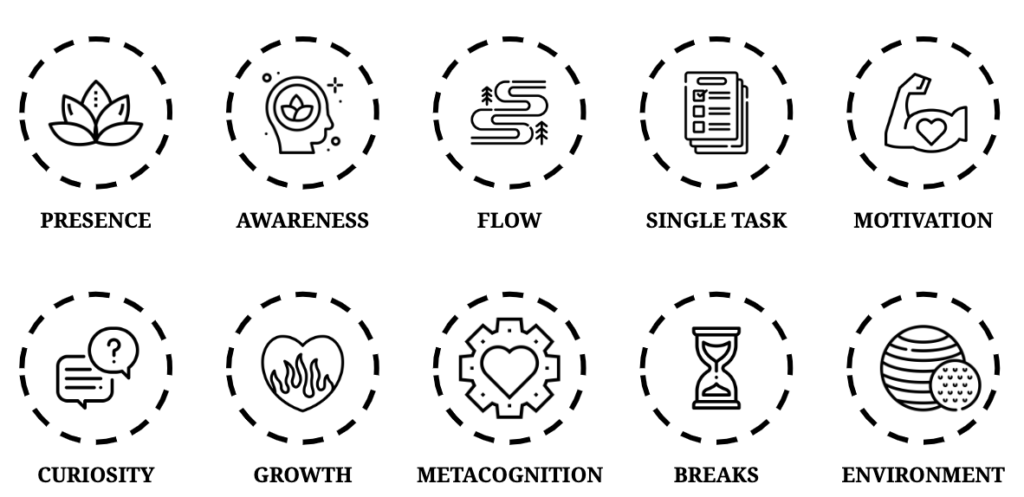Mindful Productivity: A New Way to Work and Think
Mindful productivity can be defined as being consciously present in what you’re doing, while you’re doing it, in conjunction with managing your mental and emotional states. Mindful productivity is about calmly acknowledging and accepting your feelings and thoughts while engaged in work or creative activities. It’s a way to give us new perspectives on work, life, the creation process; helping us enjoy the work and better understand ourselves. Besides helping with focus, mindful productivity also helps us notice signs of anxiety or stress at work earlier and better deal with them.
Principles of mindful productivity
Things can get hectic, so how do you become more mindful in the context of a busy work day? How can you apply mindfulness principles at work? The good news is you don’t need to meditate every day to experience the benefits of mindful productivity. There are a few ways you can inject mindfulness strategies into your work day so you can perform at your best while managing your mental health. Here are ten of mindful productivity principles, alongside links to learn more.

Free yourself from past and future worries.
Don’t get trapped in reliving past work problems or pre-living future worries. If you’re struggling with a particularly painful memory at work, such as an epic project failure, use the noterday exercise to move on and focus on the present moment.
Watch your thoughts and emotions at work.
This is not about judging your emotional and mental states. Rather, it’s about being aware of them, accepting them, and moving on so you can get back to being productive. Each time your mind wanders, just acknowledge the thoughts and emotions, and bring your attention back to the task at hand.
Get in the flow.
To achieve a flow state, you need to find the right balance between the challenge of the activity and your own skills levels. Define your goal, cut out distractions, take a deep breath, and keep your mind fully attentive so you can stay relaxed and focused.
Avoid multitasking.
Humans are notoriously bad at multitasking. But few people can afford to stay focused on a single task until it’s done. Customers need to be helped, emails need to be answered. Use mindful context switching to strike a balance between productivity and responsiveness.
Question your procrastination.
Struggling to get motivated? Finding its roots in our biology, procrastination is the result of a constant battle in our brain between the limbic system and the prefrontal cortex. Understanding the emotions behind procrastination is essential to overcome it. Run a quick motivation clinic to analyse the reasons why you struggle to feel motivated.
Cultivate your curiosity.
Research found that 98% of young children get the highest possible score on the standardised creativity test. Only 2% of adults get that score. This decrease in creativity has been linked to a decrease in curiosity. In order to be productive and creative, make sure to balance your input and output. Observe the world, take time to learn, ask questions, don’t take anything for granted.
Develop a growth mindset.
Having a growth mindset means you believe you can improve your intelligence and skills with hard work. Having a growth mindset is linked to better resilience and better long-term performance. Question your fixed mindset attitudes (“I can do math” or “She’s such a natural, I’d never be this good”) and practice the “not yet” technique (“I don’t know how to code” become “I don’t know how to code yet”).
Use metacognitive strategies.
Metacognition is “thinking about thinking” or “learning about learning.” Instead of blindly working away, take the time to plan, monitor, and evaluate your working and learning experiences. One of my favourite tools to increase your metacognition is Roam Research.
Pay attention to your work environment.
It’s easy to just come into the office or if you work from home, to come open your laptop and start working without questioning your work environment. Be mindful of where you work and how it affects your productivity. Is your environment cluttered? Noisy? Note that none of these are negative in themselves—some people do feel more creative in messy, noisy environments. It’s all about being aware of what works for you and adapting your environment based on your findings. If you’re curious about this topic, you may want to learn more about environmental psychology.
Take mindful breaks.
Not just getting up to grab a cup of coffee, but instead using breaks to remind yourself to be mindful of your thoughts, emotions, and your environment. If you need some inspiration, use this Chrome extension that gives you scientifically-proven mindfulness practices you can use during your breaks at work, with links to the corresponding research papers.
For this and much more Information relating to employability skills, employment opportunities, career advancement and entrepreneurship development; Join our Telegram and WhatsApp groups, and also follow us on Twitter and Facebook.
Culled from: Nesslabs.




